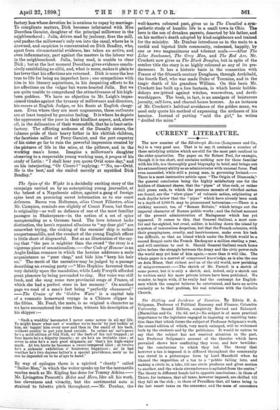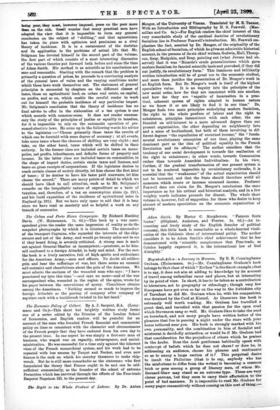The Shifting and Incidence of Taxation. Sy Edwin R. A.
Seligman, Professor of Political Economy and Finance, Columbia University. Second Edition, completely Revised and Enlarged. (Macmillan and Co. 12s. 6d. net.)—No subject is of more practical importance to the legislator engaged in imposing or remitting taxa- tion than that which forms the subject of Professor Seligman's work, the second edition of which, very much enlarged, will be welcomed both by the students and by the politicians. It would be untrue to say that the subject has not received attention in the past, but Professor Seligman's account of the theories which have prevailed shows how conflicting they were, and how bewilder- ing the conclusions to which they led. The theory that however a tax is imposed it is diffused throughout the community was stated in a picturesque form by Lord Mansfield when he likened the imposition of a tax to a "pebble falling into, and making a circle in, a lake, till one circle produces and gives motion to another, and the whole eircumference is agitated from the centre." The theory in different hands led to opposite conclusions ; in those of Thiers, for instance, that all taxes, however imposed, are shifted till they fall on the rich ; in those of Proudhon that, all taxes being in the last resort taxes on the consumer, and the masa of constniers beth g poor, they mast, however imposed, press on the poor more then on the rich. Small wonder that many practical men have adopted the view that it is impossible to form any general conclusion on the subject of "shifting," and that agnosticism has taken its place with optimism and pessimism as a rival theory of incidence. It is to a restatement of the doctrine and ite application to the problems of actual life that Mr. Seligman has devoted himself in the second part of the volume, the first part of which consists of a most interesting discussion of the various theories put forward both before and since the time of Adam Smith. His method is as scientific as his conclusions are sane and reasonable. Starting with the remark that the problem is primarily a question of prices, he proceeds to a convincing analysis of the general laws of value and the varying conditions under which these laws work themselves out. The statement of general principles is succeeded by chapters on the different claims of taxes, those on agricultural land, on urban real estate, on capital, on profits, and so on, which enable the careful reader to work out for himself the probable incidence of any particular impost. Mr. Seligman's conclusion that the theory of incidence has no final advice to offer in the elaboration of a tax system is one which accords with common-sense. It does not render unneces- sary the study of the principles of justice or equality in taxation, for it is impossible to rely on the automatic operation of pre- sumed absolute laws. He sums up in the following words his advice to the legislator :—" Choose primarily those taxes the results of which can be foretold with some degree of accuracy ; at all events, take some taxes where the chances of shifting are very slight ; and take, on the other hand, taxes which will be shifted in their entirety. In the former class are included certain taxes on mono- polies, net profits, inheritances, and definite forms of property and income. In the latter class are included taxes on commodities, in the shape of import duties, certain excise taxes and licenses, and taxes on gross receipts of corporations. If the legislator desires to reach certain classes of society directly, let him choose the first kind of taxes ; if he desires to have his taxes paid unawares, let him choose the second." There are many points of detail to which we should have liked to call attention, such as to Mr. Seligman's remarks on the inequitable nature of expenditure as a basis of taxation, and, therefore, of a tax on consumption alone (p. 221), and his lucid exposition of the incidence of agricultural rates in England (p. 231). But we have only space to add that it is long since we have read so masterly and so helpful a work on any branch of economics.







































 Previous page
Previous page